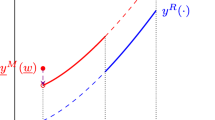Abstract
A new solution concept is axiomatically characterized for tournaments that represent cooperative majority voting. The predicted set of outcomes lies inside the top-cycle set, the uncovered set, and the Banks set.
Similar content being viewed by others
References
Banks JS (1985) Sophisticated voting outcomes and agenda control. Soc Choice Welfare 4:295–306
Banks JS, Bordes GA (1988) Voting games, indifference, and consistent sequential choice rules. Soc Choice Welfare 5:31–44
Bordes G (1976) Consistency, rationality, and collective choice. Rev Econ Stud 43:447–457
Campbell DE (1977) Computational criteria for voting systems. Br J Polit Sci 7:85–98
Deb R (1977) On Schwartz's rule. J Econ Theory 16:103–110
Dutta B (1988) Covering sets and a new Condorcet choice correspondence. J Econ Theory 44:63–80
Farquharson R (1969) Theory of voting. Yale University Press, New Haven
Ferejohn JA, Grether D (1974) On a class of rational social decision procedures. J Econ Theory 8:471–482
Fishburn PC (1977) Condorcet social choice functions. SIAM J Appl Math 33:469–489
Litvakov B, Vol'skiy V (1985) Tournament methods in choice theory. Social Science Working Paper 558, Cal Tech
May KO (1954) Intransitivity, utility, and the aggregation of preference patterns. Econometrica 22: 1–13
McGarvey DC (1953) A theorem on the construction of voting paradoxes. Econometrica 21:608–610
McKelvey RD (1986) Covering, dominance, and institution free properties of social choice. Am J Polit Sci 30:283–314
McKelvey RD, Niemi RG (1978) A multistage game representation of sophisticated voting for binary procedures. J Econ Theory 18:1–22
Miller NR (1980) A new solution set for tournaments and majority voting. Am J Polit Sci 24:68–96
Miller NR (1983) The covering relation in tournaments: Two corrections. Am J Polit Sci 27:382–385
Miller NR, Grofman B, Feld S (1986) Cycle avoiding trajectories in majority voting tournaments. Working paper, School of Social Science, University of California, Irvine
Moon J (1968) Topics on tournaments. Holt, Rinehart and Winston, New York
Moulin H (1979) Dominance solvable voting schemes. Econometrica 47:1337–1351
Moulin H (1986) Choosing from a tournament. Soc Choice Welfare 3:271–292
Ordeshook PC, Schwartz T (1987) Agendas and the control of Political outcomes. Am Polit Sci Rev 81:179–199
Packard DJ (1975a) A note on Wittgenstein and cyclical comparatives. Analysis 36:37–40
Packard DJ (1975b) On the impossibility of measurement. Utah Academy Proceedings 52 (Part 2):36–43
Packard DJ (1982) Cyclical preference logic. Theory Decision 14:415–426
Schwartz T (1970) On the possibility of rational policy evaluation. Theory Decision 1:89–106
Schwartz T (1972) Rationality and the myth of the maximum. Noûs 6:97–117
Schwartz T (1977) Collective choice, separation of issues, and vote trading. Am Polit Sci Rev 71:999–1010
Schwartz T (1986) The logic of collective choice. Columbia University Press, New York
Shepsle KA, Weingast BR (1984) Uncovered sets and sophisticated voting outcomes with implications for agenda control. Am J Polit Sci 28:49–74
Author information
Authors and Affiliations
Additional information
This research was supported by NSF grants SES 8612120 and SES 8896228. I thank Georges Bordes, Gary Cox, Bhaskar Dutta, Richard McKelvey, Nicholas Miller, Emerson Niou, Peter Ordeshook, and Peyton Young for helpful comments. Niou is responsible for the example in Sect. 4. Presented at the Public Choice Society Meetings, Tucson, March 1987, and at the Jacob Marschak Interdisciplinary Colloquium on Mathematics in the Behaviorial Sciences, UCLA, October 1988.
Rights and permissions
About this article
Cite this article
Schwartz, T. Cyclic tournaments and cooperative majority voting: A solution. Soc Choice Welfare 7, 19–29 (1990). https://doi.org/10.1007/BF01832917
Received:
Accepted:
Issue Date:
DOI: https://doi.org/10.1007/BF01832917




